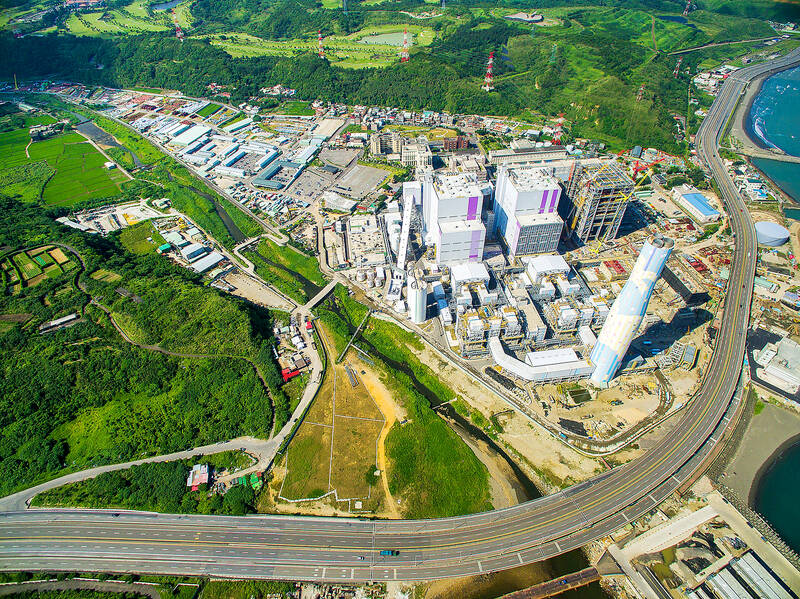Taiwan Power Co (Taipower, 台電) is looking into potential sites to store enough coal to generate up to 50 days of electricity in the event Taiwan faces a blockade or war, a source said on Saturday.
Government regulations require the utility to store up to 30 days of coal, but Taipower generally maintains a reserve of 40 to 42 days.
However, following China’s drills in August last year, during which it imposed a partial blockade around Taiwan proper, the company might further increase its coal storage to 50 days, the source said.

Photo courtesy of Taiwan Power Co
Another reason is rising coal inventories due to the nation’s transition to clean energy, as well as some coal-fired power plants shutting down during winter to reduce air pollution, they said.
“If a coal shipment arrives at a port and existing stocks have not been depleted, this causes port congestion,” the source said.
“However, Taipower has only just started looking for storage sites and it would take at least a year to conduct a feasibility study on the plan,” the source said.
The company wants to find a site near a coal-fired power plant, particularly one like the ultra-supercritical plant in New Taipei City’s Linkou District (林口), the source said.
“Another option would be Taichung Power Plant. It will decommission its coal burners and switch to natural gas, but the coal burners would be used as a backup if the need arises,” the source said.
However, Taipower would not restart coal plants in areas where they have caused public discontent, and any restarted plants would use ash ponds to reduce the amount of airborne pollutants, the source said.
Taipower hopes that the central government would subsidize the expenses that would arise from expanding coal storage capacity, especially as the plan would improve national security, the source added.
Separately, CPC Corp, Taiwan (CPC, 台灣中油), which maintains stocks of liquefied natural gas (LNG), said it has a combined stock of 100 days of LNG across all of its facilities nationwide — exceeding the mandated minimum of 90 days.
However, to improve energy security, the company would install additional storage tanks at receiving stations, including those at Taoyuan’s Guantang Industrial Park (觀塘工業區), Kaohsiung’s Yongan Port (永安) and the terminal in Taichung.
The additional tanks would increase storage capacity at each facility from 16 days to 24 days, the company said.

ENDEAVOR MANTA: The ship is programmed to automatically return to its designated home port and would self-destruct if seized by another party The Endeavor Manta, Taiwan’s first military-specification uncrewed surface vehicle (USV) tailor-made to operate in the Taiwan Strait in a bid to bolster the nation’s asymmetric combat capabilities made its first appearance at Kaohsiung’s Singda Harbor yesterday. Taking inspiration from Ukraine’s navy, which is using USVs to force Russia’s Black Sea fleet to take shelter within its own ports, CSBC Taiwan (台灣國際造船) established a research and development unit on USVs last year, CSBC chairman Huang Cheng-hung (黃正弘) said. With the exception of the satellite guidance system and the outboard motors — which were purchased from foreign companies that were not affiliated with Chinese-funded

PERMIT REVOKED: The influencer at a news conference said the National Immigration Agency was infringing on human rights and persecuting Chinese spouses Chinese influencer “Yaya in Taiwan” (亞亞在台灣) yesterday evening voluntarily left Taiwan, despite saying yesterday morning that she had “no intention” of leaving after her residence permit was revoked over her comments on Taiwan being “unified” with China by military force. The Ministry of the Interior yesterday had said that it could forcibly deport the influencer at midnight, but was considering taking a more flexible approach and beginning procedures this morning. The influencer, whose given name is Liu Zhenya (劉振亞), departed on a 8:45pm flight from Taipei International Airport (Songshan airport) to Fuzhou, China. Liu held a news conference at the airport at 7pm,

GRIDLOCK: The National Fire Agency’s Special Search and Rescue team is on standby to travel to the countries to help out with the rescue effort A powerful earthquake rocked Myanmar and neighboring Thailand yesterday, killing at least three people in Bangkok and burying dozens when a high-rise building under construction collapsed. Footage shared on social media from Myanmar’s second-largest city showed widespread destruction, raising fears that many were trapped under the rubble or killed. The magnitude 7.7 earthquake, with an epicenter near Mandalay in Myanmar, struck at midday and was followed by a strong magnitude 6.4 aftershock. The extent of death, injury and destruction — especially in Myanmar, which is embroiled in a civil war and where information is tightly controlled at the best of times —

Taiwan was ranked the fourth-safest country in the world with a score of 82.9, trailing only Andorra, the United Arab Emirates and Qatar in Numbeo’s Safety Index by Country report. Taiwan’s score improved by 0.1 points compared with last year’s mid-year report, which had Taiwan fourth with a score of 82.8. However, both scores were lower than in last year’s first review, when Taiwan scored 83.3, and are a long way from when Taiwan was named the second-safest country in the world in 2021, scoring 84.8. Taiwan ranked higher than Singapore in ninth with a score of 77.4 and Japan in 10th with